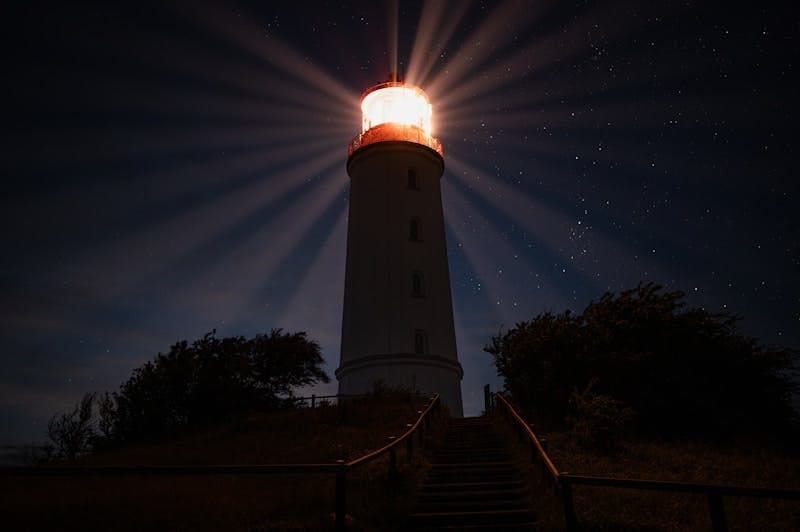I promised you another genre newsletter, and here is one that poured out of me, though it is admittedly different than I expected. This week, the genre I’m tackling is what I’m calling the “lighthouse book.”
We are dealing with some heavy times right now. If you’re paying attention to headlines, then you already know they’re filled with violence, destruction, injustice, and political nastiness. It feels like it’s everywhere and that there’s little you can do about it all.
Now, I’m going to get personal with you: My family is going through some heavy times right now too. We’re in a place of limbo, in which we must wait to see whether we’ll have positive answers to questions about stability and faith and how to move forward in the face of unexpected darkness and loss.
Amidst it all, through all the waiting and the wondering and the anxiety that comes with uncertainty, I, of course, turn to books.
But not just any kind of book, the right book. The type of book I’m calling a “lighthouse book.” And no, I don’t mean a book about lighthouses (though they are pretty cool). I mean a book that is a beacon in the dark. A book that guides us forward on rough tides of life. A book that brings us home, to safety.
The other day, as I was thinking about this concept of a lighthouse book, I made a list of books that have been those books for me: 5-star, ugly-cry, rich in hope, heart-breaker books that make you feel reborn. Here’s my personal list:
The Invisible Life of Addie LaRue by V.E. Schwab
The Midnight Library by Matt Haig
The Art of Racing in the Rain by Garth Stein
The Book Thief by Markus Zusak
The House in the Cerulean Sea by T.J. Klune
Extremely Loud and Incredibly Close by Jonathan Safran Foer
I’ll Give You the Sun by Jandy Nelson
Looking at this list, with the exception of The House in the Cerulean Sea, none of these books are what I would call “happy” books. They aren’t what I’d call “feel good” books. So why were they like lighthouses for me? Why do I look at this list and feel myself choking up when I think of the stories?
Because of the darkness and the hope that grows out of it. Not in spite of it.
When I was in grad school, one of my mentors, author Jacqueline Davies, gave a talk about chiaroscuro in children’s literature. It was a mind-blowing presentation that I wish I could send to you all, but instead you’ll have to just allow me to summarize.
In art, chiaroscuro is the use of strong contrasts between light and dark, usually bold contrasts affecting a whole composition. And in literature, authors can use a writing equivalent to add emotional depth to their stories.
Every single book in my lighthouse books list has literary chiaroscuro.
In Addie LaRue the titular character makes a Faustian bargain and is cursed to be forgotten by every single person she encounters. So she leads a centuries-long life of loneliness and is incapable to making a lasting mark on the world. But that darkness is tempered by the art that she affects, in the small ways one person can leave a legacy and move other humans’ hearts and souls.
In The Midnight Library, the main character decides to take her own life for a myriad of reasons. Until she gets to experience all the possible other lives she might have lived and decides that maybe she’s not quite done living.
In The Art of Racing in the Rain there’s Cancer and a painful legal battle and an aging beloved dog…but the ending…the joy and hope that comes after the pain is just astounding.
I could keep going for each of these books, but suffice it to say that any book that leaves a true mark on a reader’s heart has darkness and light. It has chiaroscuro.
At this uncertain junction in my life, I’m not only searching for another lighthouse book to read (got any recs for me? Please email them!) but I’m also channeling the darkness that we are going through into my work in progress.
I’m making sense of it all through writing about it.
I know that for some, writing about painful topics feels uncomfortable. And it is! Because it’s easier to ignore or set aside the things that bring us discomfort. But, like reading a lighthouse book can make you feel hopeful, or show you a way forward through the dark, writing one can too.
I’m fired up to write this book because the darkness I’m experiencing is giving me a renewed sense of purpose with this book. At first I was just writing a fun adult romance. Because I am, first and foremost, an escapist reader. But now I know that it’s going to be bigger than that, meatier than that. And probably heavier than that, as a byproduct. But maybe it’ll also be more impactful because of that.
All of this is to say that if you are writing a book and you want it to matter deeply, that you want it to be a lighthouse book for someone else, then use the pain. Use the darkness to create more light. Take a stance, show people the way through the dark. Give them hope, soften their hearts and end with that flame of hope burning in the dark.
As “genres” go, I know this isn’t your typical one, and I promise I’ll be back at a later date with a more traditional craft newsletter. But for now, if you want to write a lighthouse book you must do three things:
1. Embrace the dark
2. Sprinkle in levity and beauty
3. End with hope
Now, I want to say one last thing about lighthouse books that you can’t control or predict. One thing that makes a lighthouse book a lighthouse book is divine timing. There’s a little bit of magic involved. I’m a big believer that the right books come to you exactly when you need them. So, like most books, they’re also subjective. The books I mentioned above are my personal lighthouse books, but you might think they were terrible. Or maybe they didn’t mean as much to you as they did to me. That’s fine. And maybe your book that you put all your pain and darkness into won’t land in the right hands at the right time. And that’s fine. Because maybe it will.
Whether you’re sick of seeing lives stolen unnecessarily in schools or by war, or you’re angry at the state of politics, or you’re struggling with something more personal. I wish you the courage to let it fuel your lighthouse book.
The world needs lighthouse books now, maybe more than they ever have. I know I do.
Want more?
I'd like to do a free live training on the subject of voice. Save the Date for Tuesday, October 1st at 9am PT and I'll come live to talk about how to craft a compelling, unputdownable voice.
And, if you're finally ready to get help with your book--whether you need guidance in drafting, staying on-track, or revision, let's chat. I have some 1:1 coaching slots opening in October and I'd love to jump on a free 30-minute story strategy call to help you untangle plot or character problems. Schedule a call here.
Happy Writing!
Karyn










